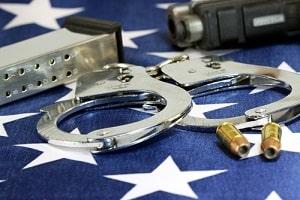What Types of Firearm Violations Can Result in Federal Charges?

The Second Amendment to the United States Constitution gives citizens the right to possess firearms. However, gun owners must also comply with a range of federal, state, and local laws regarding how and when firearms may be possessed and used. Many firearm violations are prosecuted by the federal government. Federal gun charges often carry much harsher penalties than state charges do. A person convicted of a federal firearm offense may be sentenced to years or decades of incarceration. If you have been accused of trafficking firearms across state lines, illegal possession or sale of a firearm, or other weapons violations, you need an experienced criminal defense lawyer who will fight to keep you out of prison.
Unlawful Acts Related to Firearms
The laws regulating the sale, transfer, possession, and use of firearms are mostly contained in 18 U.S. Code Chapter 44. Section 922 identifies firearm-related acts that are prohibited under federal law. These acts include but are not limited to:
-
Buying, selling, importing, manufacturing, or shipping firearms or ammunition without a valid license granting you permission to do so
-
Transporting a firearm as a licensed dealer to someone who is not a licensed dealer, manufacturer, or collector
-
Selling or delivering firearms or ammunition to an individual you have reasonable cause to believe is less than 18 years old
-
Receiving or purchasing firearms outside of the state without a valid license
-
Possessing a firearm after being convicted of a felony or while subject to a domestic violence protective order
-
Transporting prohibited weapons across state lines including machine guns, destructive devices such as bombs, or short-barrel shotguns without a valid license as a dealer, importer, manufacturer, or collector granting you permission to do so
-
Possessing or manufacturing a firearm with a missing or altered serial number
Penalties for Federal Firearm Offenses
The penalties for violating federal firearm laws vary significantly depending on the type of offense committed, the offender’s criminal background, and other information. Possession of a firearm or ammunition by someone who has been convicted of a felony crime or is otherwise prohibited from possessing a firearm is punishable by up to 10 years in prison. An individual may also face up to 10 years in prison for selling or giving a firearm to someone who is not permitted to possess a firearm. Using or possessing a firearm in furtherance of a federal violent crime or drug felony is punishable by five years in prison to life in prison. Knowingly possessing or manufacturing prohibited weapons such as a machine gun, sawed-off shotgun, semi-automatic assault weapon, or a firearm without a serial number can result in 5-10 years of incarceration.
Contact a Collin County Weapons Violations Lawyer
Federal firearms violations can result in lengthy prison sentences. If you or a loved one is being investigated by the federal government for unlawful possession, manufacture, transport, or use of a firearm, speak to an experienced Plano, Texas criminal defense attorney right away. Darlina Crowder has successfully obtained hundreds of acquittals and not guilty verdicts during her tenure as a criminal defense attorney. She and the knowledgeable legal team at The Crowder Law Firm, P.C. can help you build a strong defense against federal firearm charges. Call us today at 214-544-0061 to schedule a free consultation.
Sources:
https://www.justice.gov/sites/default/files/usao-ut/legacy/2013/06/03/guncard.pdf
https://www.justice.gov/archives/jm/criminal-resource-manual-1117-restrictions-possession-firearms-individuals-convicted

















